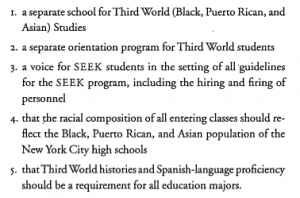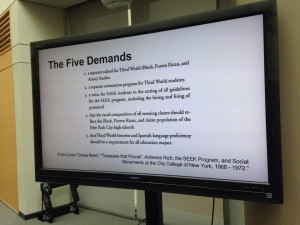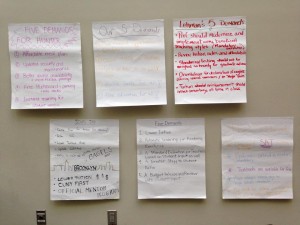What Do You Demand From Your Education?
Title: What do you demand from your education?
Context/Objectives: I developed this activity for a two-day peer mentoring workshop, organized by the Futures Initiative, which brought students from across the CUNY system to the Graduate Center to talk about student empowerment, leadership, and support networks.
Type: In-class activity
Time: 45 minutes
Lesson: After reviewing the history of student activism and protest at CUNY (one campus, or university-wide) and introducing students to the history of Open Admissions, this activity uses the five demands of the 1969 student strike and asks students to reflect on what they “demand” from their educational institution.
- I have students read through some events on this timeline (created by students in my spring 2015 Introduction to Narrative course) to familiarize themselves with some moments in CUNY history.
- We then discuss open admissions, and watch this video in which the Chancellor of CUNY defends the initiative.
- The Five Demands (from Conor Tomas Reed, “‘Treasures that Prevail’: Adrienne Rich, the SEEK Program, and Social Movements at the City College of New York, 1968 – 1972.”)

Prompt: Using the Five Demands of the student strike as an example, craft a list of five things that you demand from your education.
Additional Resources:
- Conor Tomas Reed, “‘Treasures that Prevail’: Adrienne Rich, the SEEK Program, and Social Movements at the City College of New York, 1968 – 1972.” (Read here.)
Contributed by: Danica Savonick
Imagine a Course
Title: Imagine a course
Context/Objectives: I found this writing assignment in the Lost and Found collection of Adrienne Rich’s teaching materials (Toni Cade Bambara also used a version of it with students) and used it as a warm-up, in-class writing assignment in my “Introduction to Narrative” course at Queens College.
Type: In-class writing (could also be a blog assignment)
Time: 15 min
Lesson:
“Write a description of a course you would like to take some day–on any subject, or covering any kind of material. Talk about how you feel this material could best be taught, and what you would hope to be doing in this course. (It might be film-making, writing, history, some technical skill, contemporary issues, art, etc.)…If you know books you would like to be reading in such a course, name them, telling why you chose them. Also tell why this particular course would seem valuable to you, what you hope to gain from it for your life.”
–Adrienne Rich, ‘What We Are Part Of’ Teaching at CUNY: 1968-1974. 2 vols., edited by Iemanja Brown et al. New York: The Adrienne Rich Literary Estate.
Additional Resources:
- Rich, Adrienne. (1968-1974) 2013. ‘What We Are Part Of’ Teaching at CUNY: 1968-1974. 2 vols., edited by Iemanja Brown et al. New York: The Adrienne Rich Literary Estate.
Contributed by: Danica Savonick
English Department Teaching Workshop
Teaching CUNY at CUNY
Talia Shalev, Danica Savonick, Wendy Tronrud
August 25 | 12:00 – 1:00 | The Graduate Center, CUNY rm. 4406
In this workshop, we will share approaches for thinking alongside students about the kinds of spaces for learning and writing that have been created – and challenged – by administration, activist students, and faculty at CUNY. In particular, we will share reading and writing assignments and other resources that refer to the late 1960s as a key moment of change and activism at CUNY (Open Admissions, SEEK Program)–resources that draw on the poetry and pedagogy of writers who taught at CUNY: June Jordan, Audre Lorde, and Adrienne Rich.



